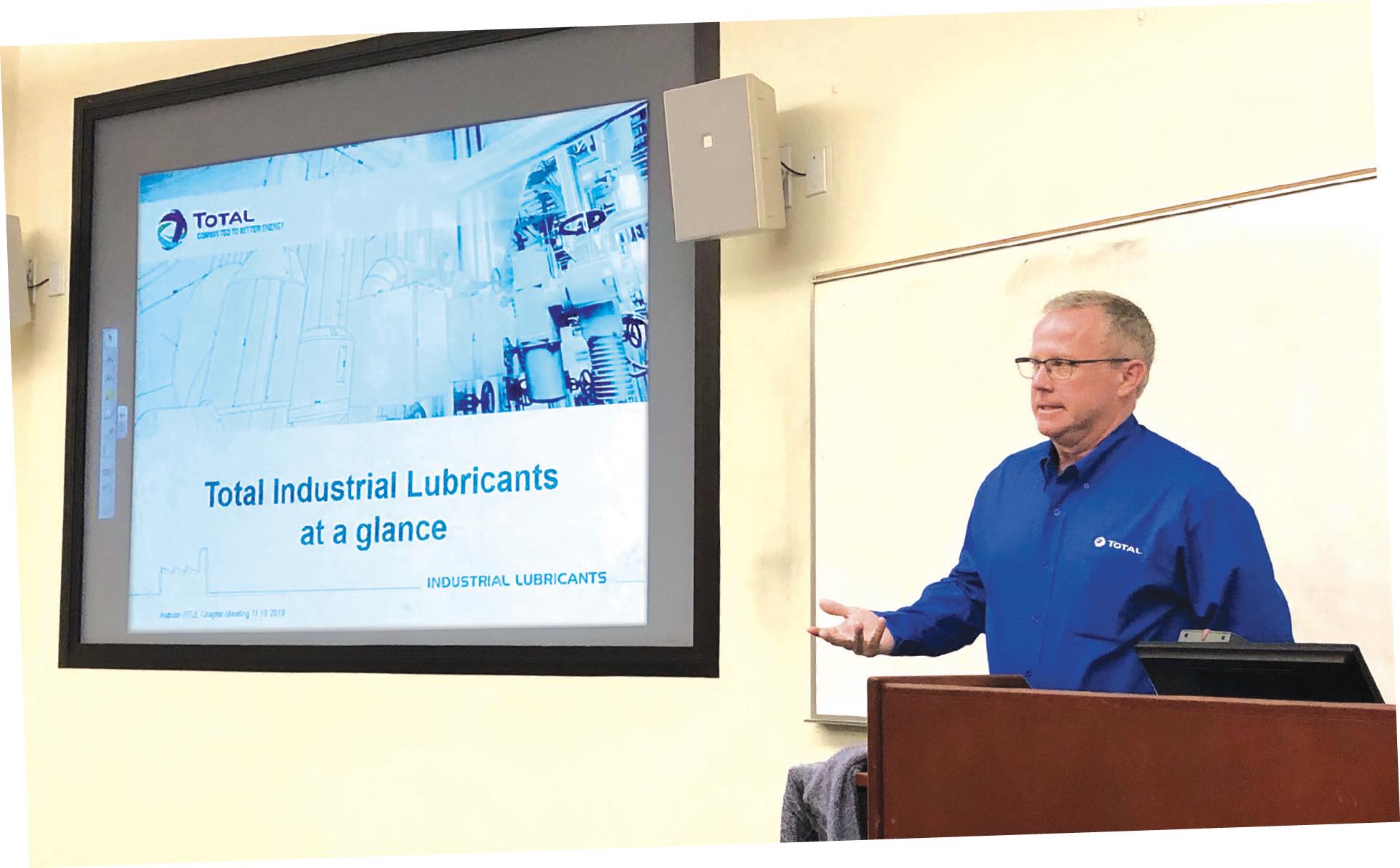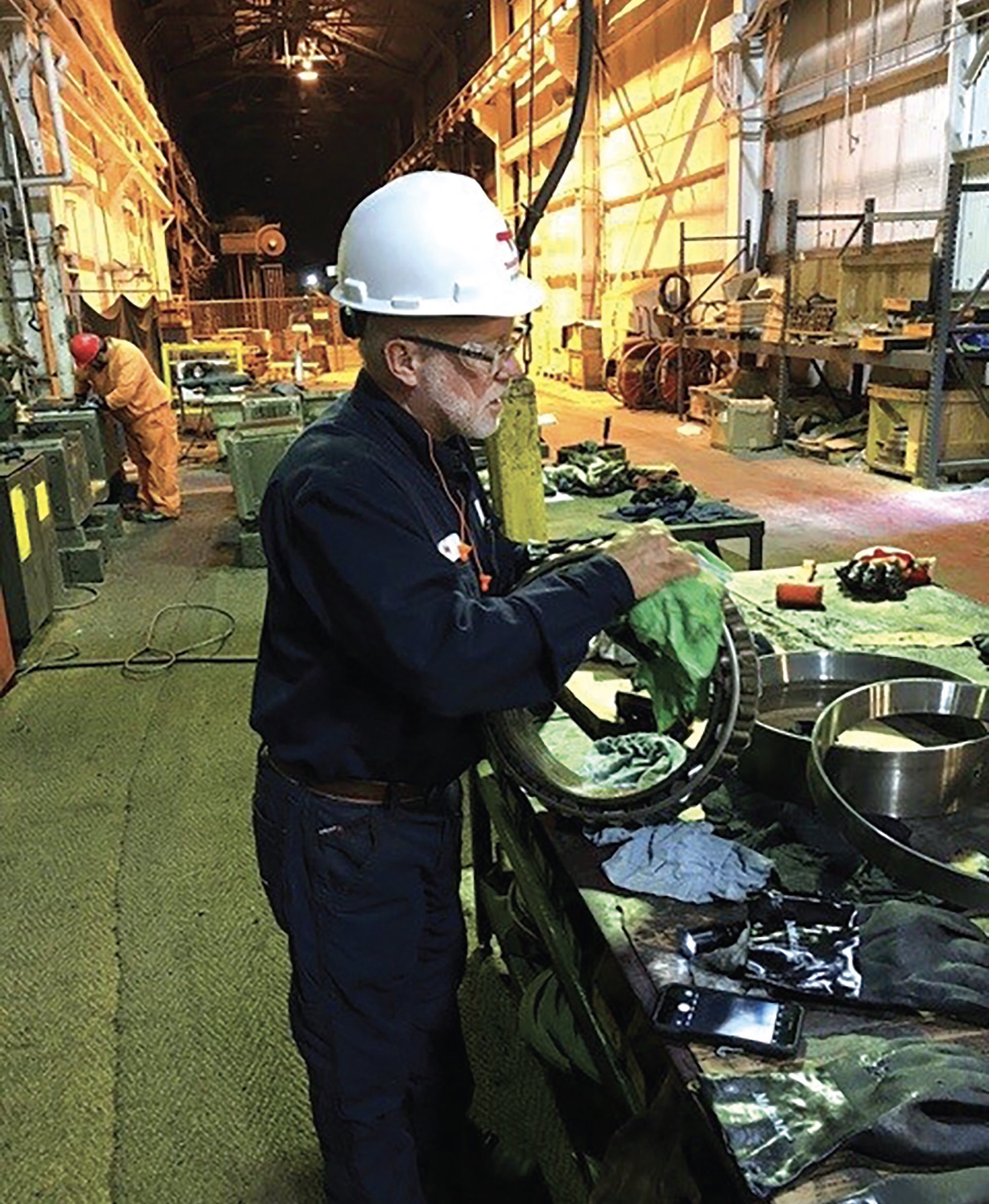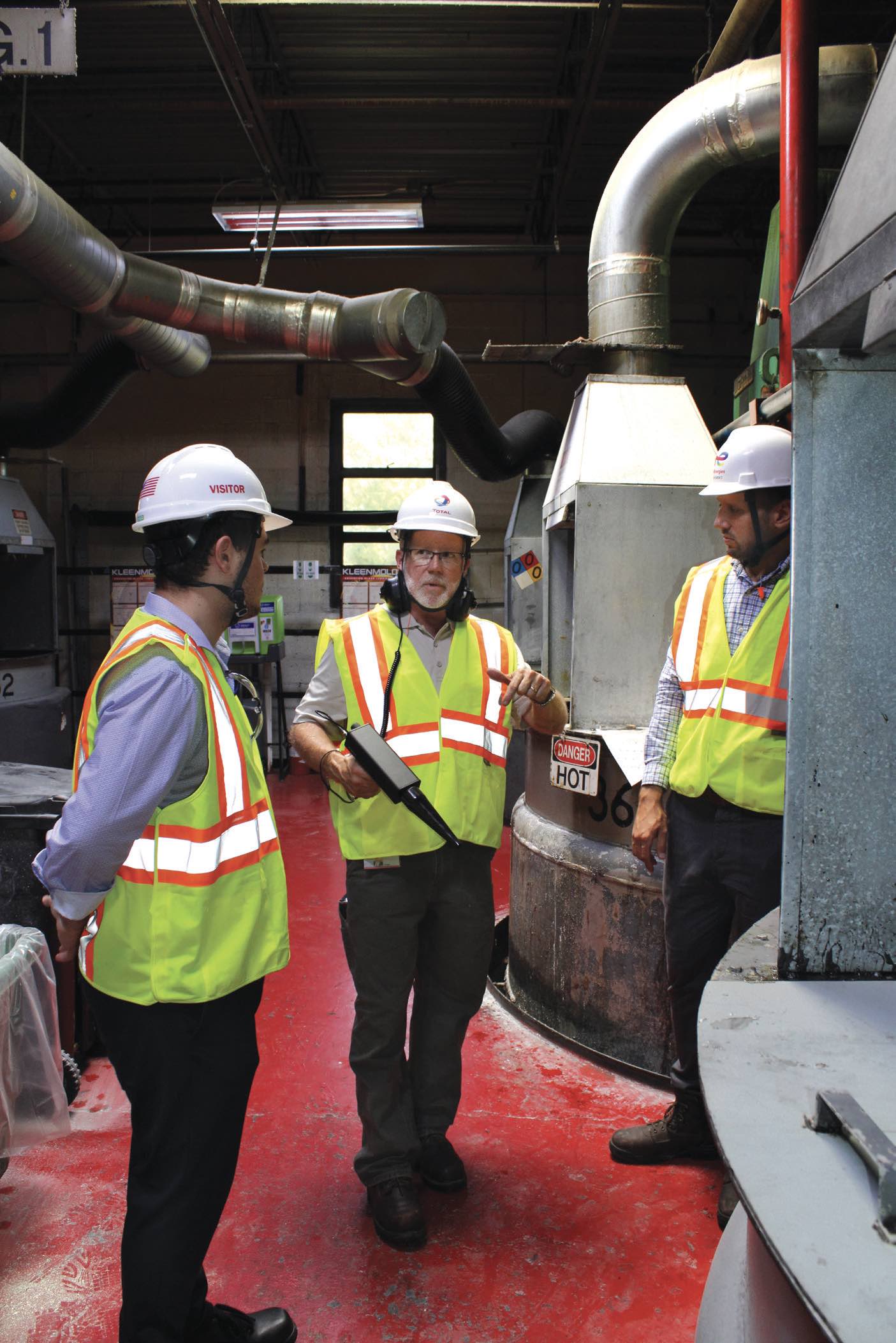TLT: What are your primary responsibilities in your role at TotalEnergies?
Sackett: I have dual roles with TotalEnergies. As senior field engineer I cover all areas of technical support for sales teams and customers in the field, training on products, lubrication best practices and assisting in setting up plant lubrication/ reliability programs. In 2022 I also took on the role as “in the field QA/QC manager” for blending plants and our distributor network handling all areas to ensure product quality throughout the supply chain to our end-users.
TLT: What aspects of your role are the most fulfilling?
Sackett: I enjoy working with and mentoring the next generation of field staff, and assisting them in becoming more knowledgeable and passionate about tribology. The greatest joy is hearing someone ask about why I love what I do and how they can follow. Each week brings a new challenge that I may be in from training, food grade, steel or aluminum; I always joke about the old show called “How It’s Made” and say I have been in a lot of those plants over my career! It keeps the job exciting and fulfilling.
TLT: Why have you chosen this career path?
Sackett: I started out as a business major that understood how to run and operate a successful business from the profit and loss (P&L) side and was asked by the owner of our company that I worked for at that time to run our lubricants side. I joked with him that the only thing my dad taught me about lubricants was where to get my oil changed! He handed me the P&L to the company, a pay raise, and I got to pick out a new truck, so I jumped in. I was blessed at that time to be able to meet some great mentors that taught and showed me many learning pathways in the industrial fields and became passionate about tribology and reliability. After that I set a goal to achieve my STLE Certified Lubrication Specialist™ (CLS) certification as it is considered the highest level of achievement for a field engineer. I always say: Never stop learning! And I have held to that, attending many STLE webinars, conferences and every year adding another book to my library on tribology, greases, reliability and best maintenance practices.
 Doug Sackett presenting on tribology and industrial lubricants and career paths in field support at Auburn University.
Doug Sackett presenting on tribology and industrial lubricants and career paths in field support at Auburn University.
TLT: Are there areas or demographics that need more attention to ensure that the next generation is well-versed, informed or trained in machinery lubrication and tribology?
Sackett: Working with STLE to ensure all the learning pathways are clear and how to achieve your certification is foremost, as you need to understand what the body of knowledge is you need to learn before you can be certified. We need to make sure that everyone knows why being certified and a member of STLE will benefit each person. STLE covers many areas from the in-depth doctoral level study of tribology wear to formulations of products, and proper use of the lubricant in the field to ensure all the benefits of the lubricant are realized.
TLT: You are very involved with STLE. Explain your interest and what motivates you.
Sackett: Joining STLE was one of the best avenues that I could utilize in my career. You can network with all members from the academic and research levels to fellow CLS, STLE Oil Monitoring Analyst™ (OMA) and STLE Certified Metalworking Fluids Specialist™ (CMFS) certified members to learn, grow and have resources for tribology applications in the field. I have learned much from TLT with great articles covering all aspects of tribology. I wanted to give back to help promote and show how STLE can partner with all in our field to grow and become more effective as a tribologist. After becoming CLS certified, I was asked to join the STLE CLS Committee that oversees and writes the test. Being a past chair for the group allowed me to be eligible for the STLE Board of Directors and elected in 2022. I eagerly volunteered for the chance to be part of a great group that works on keeping STLE in the forefront of tribology. I also volunteered for the STLE Member Ambassador Committee to promote and greet all new members. In October 2022 I co-hosted an STLE Industry Insights titled “Tribology & Sustainability: How You Can Integrate into Your Plant Reliability Program.” The STLE Industry Insights discussion series is a great way to connect with your STLE member colleagues in a casual and meaningful way in a virtual environment.
 Doug Sackett inspecting bearings for chock sets in a steel plant for grease trials.
Doug Sackett inspecting bearings for chock sets in a steel plant for grease trials.
TLT: Can you explain some of the challenges that a consumer may face when starting the process of establishing a reliability program?
Sackett: The greatest challenge in starting a process is education in how to properly set up the program and then monitor the return on investment (ROI). There is a large investment upfront in time and money, but the long-term return in increasing uptime and reducing downtime will provide greater results to your bottom line. I worked with an old papermill that was in bad shape and knew they would have to invest a large amount to start. I started by asking if they conducted a study on what increasing their uptime by 1% would do to the company’s bottom line, and it was $750,000. After a reliability study and assessment of their equipment, they would have to spend more than $1.4 million. When I told them, you could hear a pin drop in the room. However, when I showed them that it would increase their uptime by an estimated 6%, they did the math and were very happy to make the investment. Once you educate them on the ROI of reliability, they will be successful on a complete program. I enjoy working with and mentoring the next generation of field staff, and assisting them in becoming more knowledgeable and passionate about tribology.
TLT: Would it be a good idea to include your lubricant supplier and/or your lubricant distributor in the process of developing a reliability program?
Sackett: Yes, always treat your suppliers as partners in this program as they can provide great insight and assistance in making sure you are building and using the correct products and working with lubricant suppliers, oil labs and reliability product suppliers. Always make sure they have someone qualified to research, recommend and teach your staff on how to do this. Some suppliers do not have certified staff on hand, and their sales staff could be only providing you a price and not asking the correct questions to meet your asset’s needs.
TLT: What are some of the key starting components that should be included when developing a reliability program?
Sackett: Start with a complete plant survey, putting your hands and eyes on every lubricated part in your location to assess the condition, operating environment and level of reliability you are currently at to create a roadmap on how to achieve your goals of a world-class lubrication/reliability program.
 Doug Sackett conducting an air leak audit at a TE blending plant and teaching staff on proper procedures for locating leaks and documenting ROI.
Doug Sackett conducting an air leak audit at a TE blending plant and teaching staff on proper procedures for locating leaks and documenting ROI.
TLT: Would it be beneficial to provide training/certifications for the team responsible for performing the hands-on implementation of tools necessary in increasing reliability in a facility?
Sackett: Always start with an education/certification pathway for your staff to learn and know why they are taking this journey to lubrication excellence or reaching “world-class lubrication.” Once they know the “why” with training and certifications, they will know the “what” and how to complete.
You can reach Doug Sackett at doug.sackett@totalenergies.com.